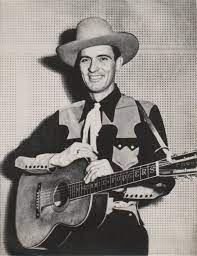
Ernest Tubb is considered one of the most influential and important performers in history as noted by the Country Music Hall of Fames website. He was a singer-songwriter and a movie actor born near Crisp, Texas in 1914. He passed away in 1984. His upbringing consisted of working on farms in different parts of Texas. For entertainment, he enjoyed watching cowboy movies. When he started getting into music where he didn’t make much income, he dug ditches for the Works Progress Administration. This was a program created during President Roosevelt’s term for the purpose of creating jobs to employ people during the Great Depression.
His involvement in the world of music started with the influences that he grew up with. The Country Music Hall of Fame points out that he first started listening to Jimmie Rodgers in 1928. Tubb was heavily influenced and inspired by Jimmie Rodgers. Inspired by what he was listening to, Tubb learned how to sing, yodel, and play guitar. When he was 19, Tubb worked as a radio singer in San Antonio where Jimmie Rodgers resided in. He would wear similar clothing, mimic Rodgers’ singing style. When his role model passed away, Tubb wrote two songs about him and eventually became friends with Jimmie Rodgers’ wife Carrie, who would also pass down her husband’s guitar down to Tubb. She would give him advice on his radio show and become more involved in his career. She managed to get him a deal with RCA, the same label that Jimmie Rodgers was signed with, and got him a tour deal with movie theatres as well.
He did not become instantly popular since his works didn’t sell as well. He signed to another label in 1940 called Decca and had success with the release of “I’ll Get Along Somehow.” This was the same year that became a full-time musician.
His lasting contribution to Texas was that he uplifted other artists as a form of paying it forward in regards to how Carrie Rodgers helped him. The Country Music Hall of Fame notes that he would take artists and bring them on tour with him, duet with them to promote their music, and put in a good word with “Opry management or record producers. ” Some artists that he helped included Hank Williams, Patsy Cline, and Johnny Cash. In addition, he accomplished a list of firsts such as the first all-country record store, the first to bring a Grand Ole Opry show to Carnegie Hall and pioneered playing electric guitar in the 50s. The Grand Ole Opry is a well-renowned country music venue in Nashville, Tennessee. As a variety show, it would host country musicians from all over and represent country music’s changes throughout history. In the 1950’s when Ernest Tubb began incorporating electric instruments into his music, the Grand Ole Opry began to reflect this change and was hosting similar music. He became the first to use these new instruments in the venue. His contributions affected venues and artists alike. Tubb became a member of the Opry in 1943, one year after his move to Nashville. Another contribution he made was pioneering the genre, Honky Tonk music which he carried over to Nashville from Texas. Britannica states that Tubb’s was one of the earliest honky-tonk country artists. A honky-tonk is a bar that plays country music and is common in the South. In regards to genre, this is a style of combining piano in a similar fashion to ragtime. David Such, a professor, and ethnomusicologist states that during the ’40s and ’50s honky-tonk music focused on the “pleasures and miseries of urban life,” usually dealing in heartbreak and women leaving their partners. These were mainly performed in honky-tonk bars and alleviated the heartache of customers.
To understand Ernest Tubb’s Texas music I choose two of his most streamed songs on Spotify and then listened to his first successful song.
One of his first successful songs was “I’ll Get Along Somehow.” It discusses how a couple broke up but the narrator tries to say that they weren’t hurt because they put up walls first.
Lyrics:
Many months have come and gone since you called me on the phone
To tell me that we were through
You thought it’d break my heart but I fooled you from the start
Cause I never did trust you
What you thought you were mighty wise to turn around with other guys
And still saying you were mine
While you had one or two I had a dozen more than you so you got to fooling that time
Oh let it rain and let it snow I don’t care oh no no no I’ll never worry now
You’re the one that wasn’t fair wasn’t tame to play square I’ll get along somehow
So you’ll keep going your way I’ll keep traveling mine
And at the end you’ll need a friend you’ll be the one to sit and pine
So let it rain and let it snow I don’t care oh no no no I’ll never worry now
You’re the one that wasn’t fair wasn’t tame to play square I’ll get along somehow
So you’ll keep going your way…
The song is simple in instrumentation and has a guitar, banjo, violin, and piano. While the lyrics don’t discuss Texas, it is representative of Texas Pride. The narrator keeps trying to one-up the significant other by stating how even though she hurt him, it doesn’t matter because he was doing the same to her. The song’s theme rallies behind the idea of not wanting to be vulnerable, a quality present in Texas Pride. The song is also representative of the Polka groove that has influenced Texas Western Swing.
The next song “Drivin’ Nails in My Coffin” is about another breakup. This song is the opposite of the song above because the narrator admits to the pain they are in from the breakup. The character in the song states how they are lonely and acknowledges that this breakup is leading to self-destructive behavior. This song was released in 1945 by Jerry Irby but Tubb’s recorded his own version which peaked at number 5 on Billboard’s folk chart.
(2.8 million streams)
Lyrics:
My sweetheart has gone and I’m so lonely she said that she and I were through
So I started out drinking for past time drivin’ nails in my coffin over you
I’m just drivin’ nails in my coffin everytime I drink a bottle of booze
I’m just drivin’ nails in my coffin Lord I’m drivin’ those nails over you
Now ever since the day that we’ve parted I’ve been so sad and so blue
I’m always thinking of you love and I just can’t quit drinking that old booze
I’m just drivin’ nails in my coffin…
Now you’ve turned me down you don’t want me there’s nothing now I can lose
I’m just drivin’ those nails in my coffin and worryin’ my darlin’ over you
I’m just drivin’ nails in my coffin…
Up to now, most of my songs have talked about love in Texas under the umbrella of patriotism. These songs analyze love in Texas in a different light–romantic. Baylor Digital Collections website details how the theme of love in Texas is applicable to different ideas. They state that “Texas is a significant setting for each love story, whether it creates an atmosphere for romance or helps to ease heartbreak.” Although Tubb makes no references to Texas, I think that his blunt lyrics about heartbreak may be the result of Texan safeness. By this I mean that this norm of Texas music is one of storytelling and pride, there is no fear of being honest. I think this is important to note especially since the first song displayed Texan pride with the idea of not being vulnerable while this song displays Texan pride with being blunt and glides into the genre of Texan ballads. Another Texan reference mentioned is the idea of booze and pairing it with heartache. Musically, both of the songs keep to the same form of repetition, a call and response form where the singer will be more prominent then instrumentations moves to the forefront, and even a solo part for the instruments.
The last song I picked was “Walking the Floor Over You” released in 1941.
3.5 million streams
Lyrics:
“You left me and you went away
You said you’d be back and just that day
You’ve broken your promise and you left me here alone
I don’t know why you did dear, but I do know that you’re gone
I’m walking the floor over you
I can’t sleep a wink that is true
I’m hoping and I’m praying as my heart breaks right in two
Walking the floor over you
Now darling you know I love you well
I love you more than I can ever tell
I thought that you loved me and always would be mine
But you went and left me here with troubles on my mind
I’m walking the floor over you
I can’t sleep a wink that is true
I’m hoping and I’m praying as my heart breaks right in two
Walking the floor over you
Now someday you may be lonesome too
Walking the floor is good for you
Just keep right on walking and it won’t hurt you to cry
Remember that I love you and I will the day I die
I’m walking the floor over you
I can’t sleep a wink that is true
I’m hoping and I’m praying as my heart breaks in two
Walking the floor over you”
This song is also about heartbreak. It is interesting how each song deals with heartbreak in different aspects. The first song reveals an attitude of indifference, the second one acknowledges that the heartbreak occurred but this one not only acknowledges the heartbreak but there is an actual supplication for the partner to come back. The electric guitar is prominent in the beginning of this song and is important to Tubb’s list of contributions because according to Songfacts, he was one of the first country music stars to use this instrument. This was also the last song he performed.
Although all songs deal with Texan pride, there are no specific references. However, the songs are still widely represented in the Texas genre, Honky Tonk.
Overall, Ernest Tubbs has made major contributions to country music and impacted the communities around him especially in Nashville and Texas. In addition, he is essential to up-and-coming artists, as he was someone who would always try to advocate and advise them.
Works Cited
“Billboard.” Google Books, Google, books.google.com/books?id=txoEAAAAMBAJ&pg=PT54&lpg=PT54&dq=billboard%2Bfilipino%2Bdetour%2Bvacancy%2Bcooley%2Bsioux%2Bdivorce%2Bpolka&source=bl&ots=ON_2gV2NSs&sig=ACfU3U1Di1fyDF7Wla2sUN4u3BSKysx_BA&hl=en&sa=X&ved=2ahUKEwirlISJvrDtAhUDuZ4KHW37DmsQ6AEwBXoECAEQAg#v=onepage&q=billboard%20filipino%20detour%20vacancy%20cooley%20sioux%20divorce%20polka&f=false.
Britannica, The Editors of Encyclopaedia. “Ernest Tubb”. Encyclopedia Britannica, 2 Sep. 2021, https://www.britannica.com/biography/Ernest-Tubb. Accessed 6 October 2021.
“Ernest Tubb: Artist Bio.” Country Music Hall of Fame, countrymusichalloffame.org/artist/ernest-tubb/.
“Ernest Tubb.” Grand Ole Opry, 4 Nov. 2019, https://www.opry.com/artists/ernest-tubb/.
“History New.” Grand Ole Opry, 15 Sept. 2020, https://www.opry.com/history/.
“Love Notes: Texas.” Baylor Digital Collections Exhibits, sites.baylor.edu/digital-collections/love-notes-texas/.
Songfacts. “Walkin’ the Floor over You by Ernest Tubb – Songfacts.” Song Meanings at Songfacts, www.songfacts.com/facts/ernest-tubb/walkin-the-floor-over-you.
Speulda, Lou Ann, and Rhoda Owen Lewis. History of the CCC and WPA and Other Depression-Era … www.fws.gov/uploadedFiles/Depression%20Era%20Programs%20-%20Region%206.pdf.
Such, David. “Introduction to Honky Tonk Blues and Honky Tonk Defined. https://ccs.instructure.com/courses/1428874/pages/introduction-to-honky-tonk-blues-and-honky-tonk-defined
Wolfe, Charles K. “Grand Ole Opry.” Tennessee Encyclopedia, Tennessee Historical Society, 1 Mar. 2018, https://tennesseeencyclopedia.net/entries/grand-ole-opry/.

